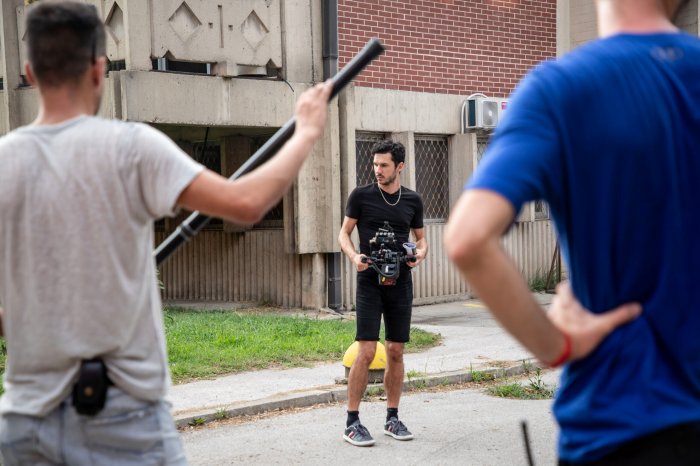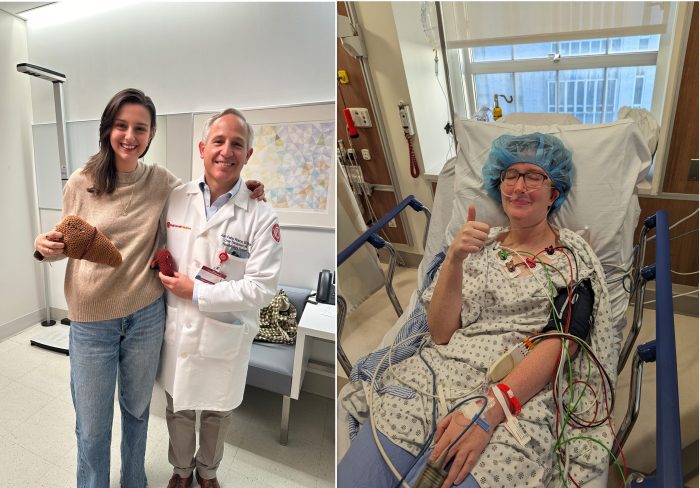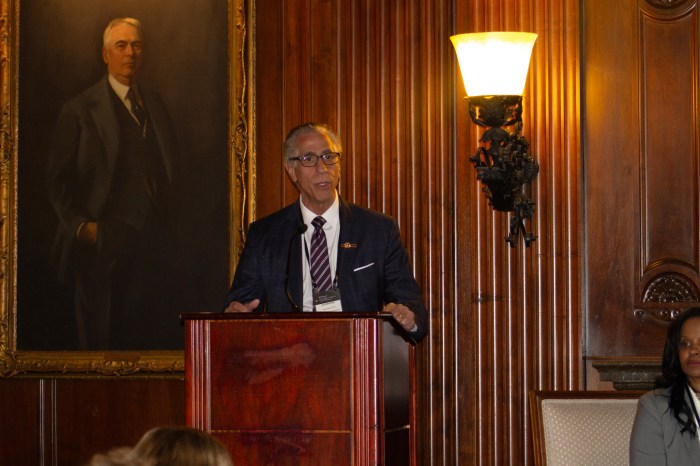BY LAWRENCE FERBER | Filmmaker and AIDS activist Gregg Bordowitz has traveled extensively with his films: 1993’s Fast Trip, Long Drop, an intensely personal experimental documentary, took him to Sundance, Turin, Jerusalem, and many other cities. This time around, however, Bordowitz traveled while making his new film, Habit, which is showing at the Museum of Modern Art tomorrow as part of their Documentary Fortnight festival of new non-fiction films. A sequel to Fast Trip, Habit is composed of three sections—Bordowitz going about his AIDS medication rituals at home; the desperate struggle to access AIDS drugs by South African activists; and discussions with friends like feminist filmmaker Yvonne Rainer about how they reconcile concepts like “habit” and “foreignness.” Habit began its life when Bordowitz (HIV-positive since 1988), traveled to Durban, South Africa to attend the 2001 AIDS Conference. There he shot 18 hours of footage and realized this could serve as a starting point for a new project. “When I was involved with ACT UP in the 80s and 90s we always wanted to do something effective about AIDS as an international epidemic,” Bordowitz says during a conversation with Gay City News. “But we didn’t have the wherewithal. We were very preoccupied with what was going on in New York. So going to Durban was finally an opportunity. [As things came together], I was trying to make a tape that would allow various audiences here in the USA to learn about global AIDS activism. Also, as an artist I’m interested in how I having AIDS connects me to others in the world who have AIDS. And the body, issues of the body and illness and what it means to have a body and how we think of our bodies as separate from ourselves.” An openly bisexual, former painter, Bordowitz began creating video work in 1983. Hailing from New York, he worked at GMHC between 1988-1993 and co-produced the Living With AIDS cable program. He moved to Chicago five years ago, motivated by a relationship with Claire, his partner of nine years (she also appears in Habit) and an assistant professor position with the film department of School of the Art Institute of Chicago. How does Habit differ from its predecessor, Fast Trip, Long Drop? Habit is much quieter film. Fast Trip was driven by rage, and I thought it was going to be my last work—I tried to say whatever I felt was un-sayable (sic) at that moment. Habit is a much more reflective work, factoring in that I did not die. I am on the new drugs. To have access to treatment is an enormous privilege. With that privilege comes a responsibility to help those who need access to treatment to get it. Has your personal experience with medications been completely positive? The cocktails work for me but they’re limited. Because I started treatment before the cocktails, in the language of science I am not “naive”. I have been exposed to earlier forms of the drugs. They’re keeping me alive and seem to work well for 2 or 3 years, but that seems to be their life [and then I have to change meds – I changed cocktails while making Habit].” One of the South African activists in your film, Zackie Achmat, goes so far as to smuggle in drugs from Thailand. What was the most profound experience you had down there in relation to their disastrous drug access situation? After the Conference, a group of PWAs from the United States sat down with our South African counterparts at a casual dinner party, just outside of Cape Town, in the warm home of Zackie. Zackie, a 38-year-old HIV positive gay former anti-apartheid activist, also chairs the Treatment Action Campaign (TAC), a three-year-old AIDS organization that seized the world stage with a massive pre-conference protest march. At one point, the conversation lapsed into silence, and Zackie seized the moment. He asked each of us Americans to pull out our HIV meds and show them to the assembled guests. We were flabbergasted and embarrassed, but we took them out and put them on the table and each of us explained the meds, their benefits and side effects. All the SA activists were touching them, and I worried they might take our pills! Then I realized many of these activists hadn’t even seen what they were fighting for. It was a brilliant move on Zackie’s part because he managed to make everyone at the table aware of the huge gap of privilege between us and them without guilt. And what I came away with was a deep self-understanding that the SA activists don’t want our pills. They want their own. Has Habit screened in South Africa? What has been the reaction? I sent Habit to a few people including Zackie. I’ve heard no response from him although, through the grapevine, I heard that he was less than enthusiastic. The needs are so great and the struggle so dire, that the reflective quality of Habit and all its detours comes off as extraneous or unnecessary to the discussion of global AIDS. But I stand by the tape. There is plenty of documentary work that address the issue of global AIDS and the story of Zackie Achmat explicitly. My work is trying to do something else. Personally, I don''t like documentaries that leave an audience feeling like they have done something about AIDS simply by watching the work. I am not interested in making work that is a window into a situation or a window into someone''s life. I don''t like works that guarantee certainty. My work is made to undermine feelings of certainty about the situations they depict. I am trying to invite people to produce their own knowledge about situations. Will your next film be another “installment,” or a completely different work from Habit and Fast Trip? My next film will be the third installment following Habit and Fast Trip. I didn’t really talk much about the complexity of HIV prevention and discussions around sexual identity [in Habit]. I want enough room to just talk about that. In the last four or five years, five of my friends, all gay men, after a decade of remaining HIV negative, seroconverted to HIV positive. And I am preoccupied with the complexities that brings up. You have a sexual relationship with Claire, who remains HIV negative.
LGBTQ+ events in NYC
Tomorrow, 8 pm
April 28, 7:30 pm
May 2, 8 pm
Politics
 Biden’s new Title IX rules protect LGBTQ+ students, but avoid addressing transgender athletes
Biden’s new Title IX rules protect LGBTQ+ students, but avoid addressing transgender athletes Biden campaign launches ‘Out for Biden-Harris’ to mobilize LGBTQ voters
Biden campaign launches ‘Out for Biden-Harris’ to mobilize LGBTQ voters Hundreds remember David Mixner’s life and legacy in NYC
Hundreds remember David Mixner’s life and legacy in NYC The Trump camp and the White House clash over Biden’s recognition of Transgender Day of Visibility
The Trump camp and the White House clash over Biden’s recognition of Transgender Day of Visibility Spending bill excludes most anti-LGBTQ riders, but bans Rainbow Flags at State Department
Spending bill excludes most anti-LGBTQ riders, but bans Rainbow Flags at State Department
Crime
 Answers sought in murder of Black trans man in Florida
Answers sought in murder of Black trans man in Florida No punishment for cops in Kawaski Trawick case, NYPD says
No punishment for cops in Kawaski Trawick case, NYPD says Two men arrested on drug charges in Cecilia Gentili’s death
Two men arrested on drug charges in Cecilia Gentili’s death Bigot with box cutter attacks gay man on board A train in Midtown: cops
Bigot with box cutter attacks gay man on board A train in Midtown: cops Man guilty in Black transgender woman’s killing in 1st federal hate crime trial over gender identity
Man guilty in Black transgender woman’s killing in 1st federal hate crime trial over gender identity























